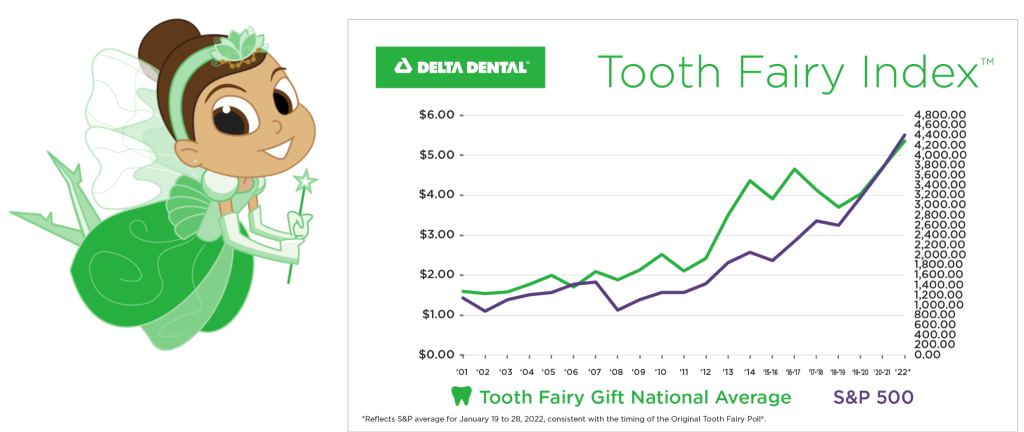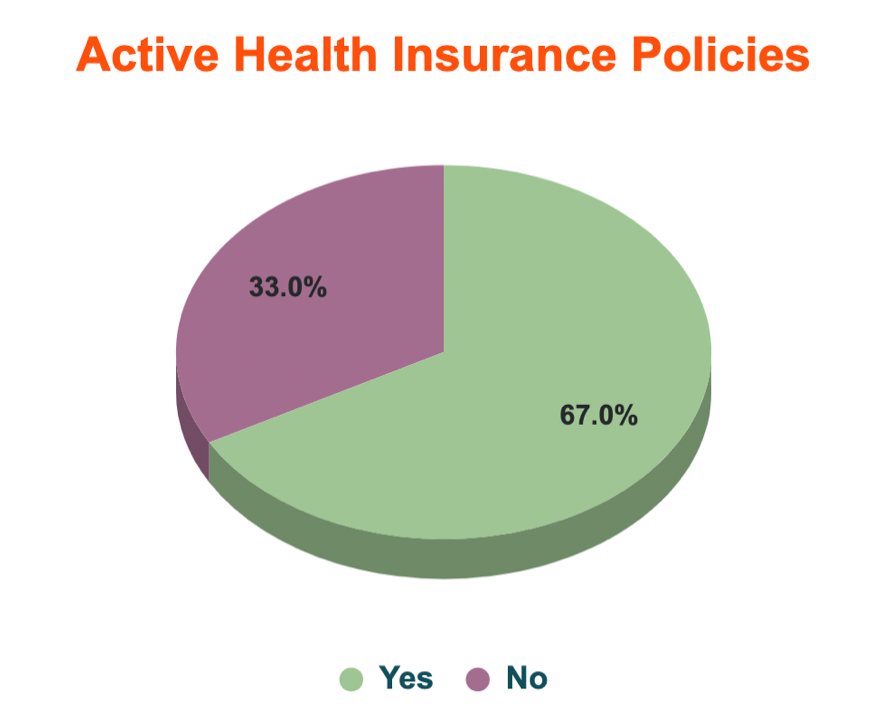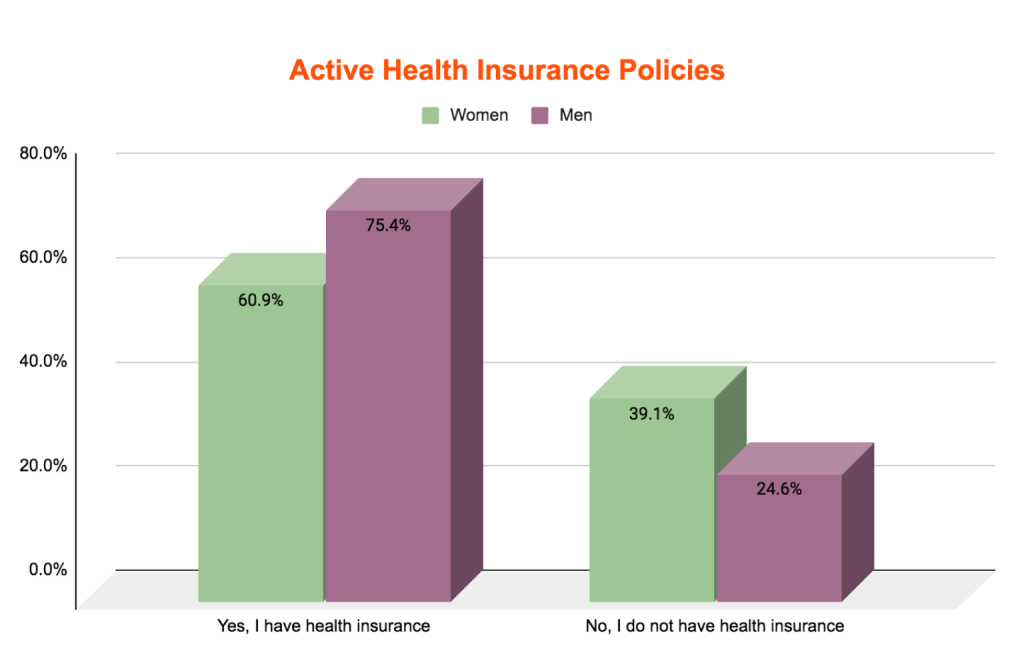 Remember when you lost a tooth and couldn’t wait for the Tooth Fairy’s visit?
Remember when you lost a tooth and couldn’t wait for the Tooth Fairy’s visit?
In my house, I’d find a shiny silver dollar under my pillow. We know kids still love to put their baby teeth under their pillows in anticipation of a visit from the Tooth Fairy. According to Delta Dental’s Original Tooth Fairy poll, the beloved Tooth Fairy visited 79% of homes across the country with children ages 6-12 who have lost teeth.
One in 3 parents agree that the Tooth Fairy is a positive way to instill good oral health habits in their child. This year, more parents said that the Tooth Fairy provided their child with an opportunity to celebrate something fun (55% 2022 versus 48% 2021) at a time when it was sorely needed!
“Our oral health is essential to our overall health, and the time-honored tradition of the Tooth Fairy can help bring attention in a fun way to the importance of establishing proper oral hygiene habits at an early age,” said Jennifer Elliott, Chief Marketing Officer, Delta Dental Plans Association.
The Original Tooth Fairy Poll has generally been a good barometer of the overall direction of the economy. In fact, for 17 of the past 20 years, the trend in average giving has tracked with the movement of the S&P 500.
Where did the delightful Tooth Fairy come from anyway? The first published mention was a 1908 Chicago Tribune article by author Lillian Brown. She gave new parents a suggestion that would help them persuade children to have their loose baby teeth pulled — tell them the “tooth fairy”would leave a small gift of 5 cents under their pillow for each tooth that they lost.
It’s possible that the tooth fairy tradition traces its roots back nearly a millennium to the 10th century Norse peoples of Europe. In the “Eddas,” the earliest recorded writings of Norse and Northern European traditions, a tradition called the “tand-fe” (translated to the “tooth fee”) is noted. Parents would gift children a small fee when they lost their first tooth. Why? There were various beliefs that teeth were valuable and brought good luck — some warriors would even fashion necklaces out of multiple teeth to protect them and keep them safe during battle.
That’s the most you’ll ever need to know about the Tooth Fairy!
MERGERS & ACQUISITIONS
Amazon Expands Foray into Healthcare with Latest Acquisition
Model for future?
Is this yet another way Amazon will dominate? Purchasing the primary care company One Medical for roughly $3.9 billion, marks the technology giant’s latest move to expand into the healthcare industry.
The deal expands Amazon’s reach into primary care as it also operates Amazon Care, which offers both virtual care services as well as in-home care to employees and other companies. For its in-person service, a medical professional is dispatched to a patient’s home or office to perform exams, tests, or vaccinations. For virtual care, People can communicate with providers through videos and messages through the Amazon Care app. Read more
COVERAGE TRENDS
Changing Landscape for 2023 Open Enrollment
Significant changes in personal situations and worker needs drive innovation, expansion of benefits
The pandemic, inflation, a tight labor market, hybrid work arrangements, and a renewed focus on emotional well-being have altered the benefits packages that employers are offering. Many are adding more features to existing plans or offering new benefits for 2023. Read on via SHRM.
Poll: MA Plans Need Better Mental Health Coverage
Medicare Advantage plan satisfaction is strong in areas like access to preventive and routine care, but members say better coverage of mental health and substance use services is needed, according to a survey by J.D. Power. Routine diagnostic services are good, according to 91% of survey respondents, and 89% said they were satisfied with preventive care coverage, but just 38% felt mental health coverage was adequate, and 27% said the same about coverage for substance use therapy. Read more.
Mental Health Coverage for Most Adults Comes Through Employer-based Plans
Health plans are increasing recruitment and training for mental health pros
About 180 million U.S. adults have employer-based health insurance plans that offer mental health care coverage, and all of the plans cover behavioral services via telehealth. The findings come from an AHIP member survey conducted from May to June, based on responses from health insurance providers offering commercial plans covering 95 million members. It showed the number of in-network behavioral health providers among commercial plans jumped 48%, on average, in the past three years. The majority of health plans are actively recruiting mental health providers, providing behavioral health training to primary care doctors and helping members find open behavioral care appointments.
Read more.
Only 67% of People Currently Have Health Insurance
Women are less likely to have coverage due to cost
Access to health insurance is a hot topic right now. A recent Forbes article reported the average health insurance cost for a single person who received health insurance benefits through their employer in 2020 was $7,040 a year, according to data from the Kaiser Family Foundation. The average cost of health insurance for a family in 2020 was more than double that number at $21,342 a year. Zelros recently surveyed over 1,000 people and found that 67.0% say they do currently have health insurance, and 33% do not currently have health insurance. And interestingly, those between 25-34 are the least likely to have coverage, with 41.5% saying they don’t.
- Women are less likely to have health insurance than men.
- 1 in 3 people do not have active health insurance policies.
- 75% of men have an active health insurance policy.
- Those in Gen Z have more health insurance coverage than millennials

POLICY
Back-to-School Prep: White House Strengthens Access to High-Quality, Comprehensive Health Care for Children
HHS issues guidance to states on ways to expand mental health care for children. In support of President Biden’s effort to address mental health crisis, they propose requirements for states to report certain health care quality measures for children and adults.
The nation is facing an unprecedented mental health crisis, particularly among children. Even before the pandemic, rates of depression, anxiety and suicidal thoughts were on the rise, with up to one in five children ages 3 to 17 in the U.S. having a mental, emotional, developmental, or behavioral disorder. The pandemic only exacerbated these issues, with increased isolation and disrupted learning, relationships, and routines. More than 40 percent of high school students – PDF struggle with persistent feelings of sadness or hopelessness, and more than half of parents and caregivers are concerned about the mental well-being of their children. Read more.
Pandemic Emergency Likely to be Extended Again
HHS has not notified state and local public health officials that the COVID-19 public health emergency (PHE) will expire or be terminated, indicating it will likely be extended in mid-October for another 90 days, says Larry Levitt, the Kaiser Family Foundation’s executive vice president for health policy. Regulatory flexibilities granted in response to the pandemic, such as expanded telehealth and Medicaid coverage, will remain in place until the end of the PHE. White House COVID-19 Response Coordinator Dr. Ashish Jha expects another surge in both COVID-19 and flu cases this fall and winter. Read more.
Rule Revises No Surprises Act Dispute Resolution Process
HHS and the Departments of Labor and Treasury released final rules governing resolution of payment disputes for unexpected out-of-network medical bills under the No Surprises Act. Under the final rule, which was revised in light of legal challenges to previously released requirements, independent arbitrators should weigh all permissible information submitted by both parties before choosing the offer that best represents the value of the service or item under dispute, and insurers must provide explanations of downcoding with the initial coverage denial or payment. Read more.
Government to stop buying COVID-19 tests, drugs
White House Covid-19 Response Coordinator Dr. Ashish Jha said the Biden administration is working to transition away from purchasing of COVID-19 vaccines, tests and treatments by the government, in a shift toward commercialization of those items beginning this fall. Jha said the transition will be made carefully to ensure access to vaccines and other items is not compromised, and the government will continue to invest in next-generation vaccines and readiness for future pandemics. Read more: CNN
PHARMACY
Future of Retail Pharmacy Increasingly Digital
Retail pharmacies are seeking new ways to survive in an increasingly competitive market. At Advisory Board’s recent Pharmacy Market Trends webinar, audience members voted on where they see the future of retail pharmacy heading, selecting from two future scenarios: pharmacies becoming the front door to care, or a boom in digital pharmacy. Health care leaders leaned towards the latter, predicting a more digital pharmacy landscape ahead. Read the story
Related: Why the boom in digital pharmacies represents a crossroads for retail pharmacy
ENVIRONMENT
Inaction on Climate Change Hurts Bottom Line
Most healthcare leaders know they should act against climate change, but little urgency exists to make organizational changes in large part because leaders believe that climate change problems are too big for any one actor to solve. But doing nothing just compounds the problem. Download this infographic to understand how climate change will exacerbate existing organizational pressures. Infographic: 3 ways your climate change inaction will hurt your bottom line: Download now
Good News
What Went Right This Week: A Breakthrough for Blind People
Medical breakthrough offers hope
Scientists have restored vision to 20 people using a bioengineered cornea made from pig skin. The breakthrough brings hope to the estimated 12.7 million people globally who are blind due to their corneas being damaged or diseased.
Before, people with cornea disease have required a transplant from a human donor to be able to see again. However, just one in 70 patients receives one.
“The results show that it is possible to develop a biomaterial that meets all the criteria for being used as human implants, which can be mass produced and stored up to two years and thereby reach even more people,” said LiU Professor Neil Lagali, a lead researcher.
A larger trial and regulatory approval is required before the implant can be used in healthcare. The results of the study were published in Nature.
Reducing Anti-Democratic Attitudes, Civil Animosity and Violence
Stanford study reveals ways to improve health of American democracy
The largest social science experiment of its kind tested 25 techniques for reducing anti-democratic attitudes, partisan animosity, and support for political violence in a study of 31,000 Americans. Stanford University’s Polarization and Social Change Lab released the results of the Strengthening Democracy Challenge—a mega-experiment that used crowdsourcing to identify short, proven, and scalable interventions to reduce Americans’ anti-democratic attitudes, partisan animosity, and support for political violence.
“This experiment proved one thing: you can change people’s views of their political rivals and their commitment to democratic principles, but what works and what doesn’t work is not obvious,” said project leader Robb Willer, professor of sociology and director of the Polarization and Social Change Lab and co-director of the Center on Philanthropy and Civil Society in the School of Humanities and Sciences at Stanford University.
The research revealed validated techniques that can be immediately applied by organizations, political leaders, and social media platforms seeking to improve the health of American democracy. The most effective of these tended to highlight relatable, sympathetic people with different political beliefs and/or build a sense of a common cross-partisan identity, correcting misperceptions about what “rival partisans” believe, and vividly illustrating the consequences of democratic collapse in other countries. Additionally, six interventions significantly reduced support for undemocratic practices by politicians, and five decreased support for partisan violence. Read more.
Featured events:
- LAAHU 7th Annual Medicare Symposium, Sept. 15, Burbank Marriott Hotel. Register
- EBN Webinar: COVID Silver Linings: How pandemic lesson will forever change healthcare delivery
Wed. Sept 28 11am PST, 2pm EST Register - Ellevate Women’s Leadership 2023 Summit March 13-15, 2/23. JW Marriott just outside Las Vegas. Register
EVENTS
- Women In Financial Services (WIFS) End Of Summer Lunch & Winery Tour, Sun., Aug. 28 at 1:00 at San Antonio Winery, RSVP to janet@wifs-losangeles.org by Friday, Aug. 26.
- WIFS-Los Angeles & NAIFA-Los Angeles present “Bust Those Myths About Life Insurance” as part of Life Insurance Awareness Month. Thurs. Sept. 8, 2022 11:30 a.m. – 1:30 p.m. PST by Zoom. Register
- OCAHU Annual CE Day, Tues. Sept. 13, 9am – 4pm In person. Earn 5 CEs. Register
- NAIC Insurance 2022 Summit (in person & virtual), Sept.19-23, Kansas City. Register
- InsurTech Connect: The Future of Insurance is Here, Sept. 20-22, Las Vegas. Info here
- CAHIP Virtual Medicare Event, Sept. 20 10 a.m. – 12:30 p.m. Register
- WIFS National Conference, Sept. 29-Oct. 1, in person, Phoenix. Info here
- National African-American Insurance Association (NAAIA) 2022 Annual Conference & Empowerment Summit, Oct. 5-7, in person. Baltimore, MD. Info here
- Self Insurance Institute of America (SIIA) ENGAGE National Conference & Expo, October 9-11, 2022 in Phoenix. Info: (800)851-7789 www.siiaconferences.org
- Life Insurance Marketing and Research Association (LIMRA) 2022 Annual Conference, Chicago on Oct. 16 – 18, 2022. Register
UPCOMING in September Print Magazine
Coming to your mailbox soon: Life Insurance Awareness Month, Finding the Right Buyer for Your Agency, OC Consumer Education Efforts, and more!
your mailbox soon: Life Insurance Awareness Month, Finding the Right Buyer for Your Agency, OC Consumer Education Efforts, and more!
Sign up for a monthly print subscription by sending your physical address to: Calbrokermag@calbrokermag.com.
